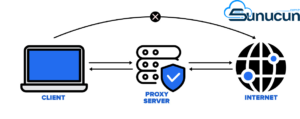What is a Proxy? What Does a Proxy Do?
When browsing the internet, sending and receiving data, or protecting privacy, proxy servers frequently come into play. So, what is a proxy? What do proxy servers do, and how do they work? In this article, we will explore what proxy servers are, their types, usage areas, and advantages in detail.
What is a Proxy?
A proxy is a server that directs a user’s internet traffic and acts as an intermediary between the target server and the user. Simply put, proxy servers act as a bridge between an internet user and the website or other digital resources they visit. This means that the traffic passes through the proxy server before reaching the target server directly.
A proxy server hides the user’s IP address, provides access to certain websites, and sometimes speeds up data traffic. Especially used for security and privacy, proxy servers can offer speed and access optimization in various situations.

What Does a Proxy Do?
Proxy servers serve various purposes and provide significant benefits in different scenarios. Here are the main benefits of using a proxy:
1. Providing Anonymity and Privacy
When connecting to a website or server over the internet, your device’s IP address becomes visible to that site. Proxy servers hide your real IP address, providing access through a different IP address. This allows you to remain anonymous online and protect your privacy. Proxy servers are particularly useful for privacy-focused users or those wanting to access geographically restricted content.
2. Bypassing Geographical Restrictions
Some websites or services allow access only to users from specific countries. For example, users outside a particular country may not be able to access content specific to that country. Proxy servers help bypass these geographical restrictions by connecting through a server located in a different country. This way, users can access digital content from anywhere in the world.
3. Enhanced Internet Security
Proxy servers can work with firewalls and filters to block access to malicious websites. Particularly used in companies and schools, proxy servers add an extra layer of security against harmful software. This improves data security for users and minimizes internet threats.
4. Data Compression and Speed Enhancement
Some proxy servers optimize internet traffic by compressing data. This can provide a faster browsing experience for users, especially those with slow internet connections. The data compression feature is a significant advantage for users seeking improved performance.
5. Overcoming Access Restrictions
Proxy servers can also be used to access websites where internet access is restricted. They are particularly useful for accessing censored or blocked sites in certain countries. This allows users to freely reach the content they desire.
What Are the Types of Proxies?
Various proxy types cater to different needs. Here are the most common proxy types:
1. HTTP Proxy
HTTP proxy servers are a type of proxy that supports only the HTTP protocol and operates over this protocol. They are commonly used for web browsers. An HTTP proxy redirects communication when a website is visited and hides your IP address. However, it is only applicable to HTTP connections.
2. HTTPS Proxy
HTTPS proxy servers are a more secure version of HTTP proxies and support encrypted internet traffic. This ensures a secure connection over the HTTPS protocol while maintaining user privacy. They are commonly used for banking and e-commerce sites.
3. SOCKS Proxy
SOCKS proxies operate without being tied to specific protocols like HTTP or HTTPS. This type of proxy supports a broader range of connections and different internet protocols (e.g., FTP, SMTP, Torrent). However, it is generally slower than HTTP proxies due to its broader scope.
4. Transparent Proxy
Transparent proxies are those that redirect and monitor internet traffic without the user’s awareness. They are often used by network administrators to monitor or restrict internet access. Users can access the internet without realizing the presence of these proxy servers.
Advantages and Disadvantages of Using Proxies
Advantages
- Privacy: Proxy servers provide anonymous browsing by hiding the user’s real IP address.
- Access: They help bypass geographical restrictions and access blocked websites.
- Security: They offer additional security against malware and malicious sites.
- Performance: Data compression features can enhance internet connection speeds.
Disadvantages
- Speed: Especially free or low-quality proxy services may slow down internet speed.
- Security Risks: Untrusted proxy servers may pose risks of personal data theft.
- Compatibility: Some websites or services may detect proxy use and block access.
Conclusion
Proxy servers are an effective solution for enhancing internet privacy, bypassing geographical barriers, and providing a secure browsing experience. When the right type of proxy is selected, significant benefits in terms of speed and security can be achieved. However, it is essential to be cautious about speed and security risks when using proxy services. By choosing a reliable proxy service, you can protect your personal information and improve your internet experience.




